You’re listening to Burnt Toast!
I’m Virginia Sole-Smith. Today I’m chatting with.
Emma is the author of the hybrid nonfiction book The Third Rainbow Girl, which was named a New York Times notable book and Editor’s Choice of 2020. She also writes
. And Emma’s new novel, Housemates, just came out on Tuesday!Today we are going to talk about Emma’s new book, but we’re also going to talk a lot about my favorite new trend invented by Emma (so says me): Frump Fashion.
Both of Emma’s, including Housemates, are available in the Burnt Toast Bookshop!
Don’t forget, you can always take 10 percent off that purchase if you also order (or have already ordered!) Fat Talk from Split Rock Books! (Just use the code FATTALK at checkout.)
PS. If you’re enjoying the podcast, make sure you’re following us (it’s free!) in your podcast player! We’re on Apple Podcasts, Spotify, Stitcher, and Pocket Casts! And while you’re there, please leave us a rating or review. (We like 5 stars!)
This transcript may contain affiliate links. Shopping our links is another great way to support Burnt Toast!
Episode 146 Transcript
Virginia
Full disclosure: We should let the folks at home know that we do share a literary agent.
Emma
True.
Virginia
Nothing about this interview was compromised by that fact, I don’t think. We just both love and admire our agent and have that in common.
Emma
It’s true. Good conflict of interest disclosure, but I think I found you totally independently of her! I think just from Burnt Toast. So it was a fun coincidence.
Virginia
Such a small world. Okay, so tell folks a little bit about yourself!
Emma
I am a writer and a fat person living in Philadelphia. I write across the genre spectrum. I write long, rambling books. My first book is called The Third Rainbow Girl. I’m a novelist at heart and a fiction writer, and my book is coming out called Housemates. I’ve also written journalism and articles about the intersection of crime and queerness, about the intersection of fatness and queerness, and about fat liberation in general.
Virginia
Let’s talk a little bit about Housemates! I just finished it at 5am because a child woke me up in the middle of the night. And I was like, well, I’m up, at least I get to read Emma’s amazing novel. It has one of the best fat protagonists I’ve read in a long time. Tell us a little bit about Leah and about Bernie, who is the other protagonist.
Emma
Housemates is about Bernie and Leah who are two queer housemates in a big chaotic, messy group house in West Philly, which is close to my heart. That’s where I live. I was interested in writing a story about two people who are not just lovers, not just friends, not just making art together, but are doing all three of those things at the same time.
Leah is the fat one—which is only one part of her personality, which was important to me. I’m really interested in the ways that fatness shows up in fiction, the lack of fat characters in fiction as we know. I did an analysis of the New York Times notable books over the past five years adn found that less than one percent of the Times notable books—100 each year over the past 5 years—have had a fat person in them.
Virginia
Out of 500 books?
Emma
Less than one percent. And that’s not just the Times, right? That’s a systemic issue in our culture and in our books landscape. So that was something that was definitely on my mind.
As I said, I’m also a fat person. It’s part of my life and my experience, but I wanted to write a character who was in an interesting place with her fatness. I think there’s all this pressure if you’re fat to be unequivocally joyful and positive in your embodiment. Leah is, I would say, definitely still struggling and grappling with how her body exists in the world and how it’s treated. Particularly in queer spaces. Queer spaces can be super white and super fatphobic, as we know, as well.
Leah’s moving through this queer strange bubble of West Philly, having all these experiences and thinking a lot about how she wants to leave and explore and see what else is out there and make art that is doing something that she’s not seeing in her life, in her neighborhood.
She’s also tall and masc and nonbinary. She uses she and they—I’m going to use she for her in this interview because the pronouns kind of change over the course of the book. But both are fine, according to her. She’s really thinking a lot about joy and pleasure with fatness. She loves sex. She’s good at sex, which I think is rarely offered to fat people, especially fat people in fiction. She’s in love with Bernie and this exciting new relationship.
At the same time, she’s thinking about how to navigate her body in spaces that are not always really safe. They’re road tripping across Pennsylvania and there are lots of things that happen that put her masc and nonbinary body in situations that are dangerous or unknown.
I wanted to write a fat person who is smart, inquiring, and searching. Not fully arrived at liberation, but not deeply entrenched in shame either. Sort of in the middle, and really coming of age and coming to figure out her own body, as many of us are.
Then Bernie is a kind of thin, squirrel-y, little lady who is also struggling with her embodiment. Even though she’s a thin person, we know fatphobia affects all the people. She’s someone who is really thinking about how to not be so alienated from her body. She is trying to think about how to be more at home inside herself. Rather than looking at herself from the outside, rather than feeling sort of dissociated from her own experience. She is someone who really struggles to feel pleasure, to enjoy sex, to enjoy connection.
I wanted to also show that Leah is actually someone who can sort of mentor and encourage Bernie along on her body journey. It’s almost like the fat person is teaching the thin person how to be in a body which is something I wanted to play with and see.
Because as fat people we think about embodiment all the time. And our friends and loved ones are sort of like what, who, where? I have a body? We can be at the forefront. Not that we must teach everyone how to have a body, but that’s a joyful gift we can give if we want to.
Virginia
Well and you give her that power and authority, when fat people are so often not allowed to be authorities on our own bodies.
I don’t want to include any spoilers in this episode because everyone’s going to go read the book, but there’s a really, really powerful scene at the end where Leah does something very physical. It’s a very cool, embodied powerful moment and subverts a lot of expectations about how fat people move and exist in our bodies.
Emma
I wanted to show Leah getting to go on a journey and a trajectory with her body that wasn’t really easy and tied up in a bow, like she starts off the book hating her body and feeling shame about fatness and by the end she’s fixed or cured or done.
I do think that there are ways that we’re constantly shifting and unlearning shame over the course of our lives. My therapist always says people heal in relation, we don’t heal in isolation. And I think there’s something powerful in the connection between these two people who are thinking a lot about art and morality and travel and America under Trump. They’re both teaching each other and growing.
Virginia
I also applaud you, though, because while she is really struggling with a lot of this, she’s not actively dieting. I appreciated that you left dieting out of the book altogether because I think the struggle of embodiment is so much more than that. It too often gets reduced down to just that one piece.
Emma
For sure. Leah doesn’t diet. She’s in this place of essentially intuitive eating, where she’s like, I’m going to sort of perk up my ears and listen to what I want and what sounds delicious and what I want to consume. Especially, like, they’re on a cross country road trip. So they’re eating like delicious things like Waffle House and Dairy Queen and whatever you may find on the road.
I think that’s part of the pleasure of a road trip is the eating and the consuming and seeing what you encounter. At the same time, she’s ambivalent or has questions about what does it mean to eat what I’m what I’m wanting or what I’m listening to. All those intuitive eating nuances that you discuss a lot in your work.
That’s very much also true to my community and my experiences here in Philly. I did this really great fat embodied healing workshop where a bunch of us were asking: What does it mean to be eating what we want to eat, to be listening to our bodies, and also to be thinking about ways of not wanting to react against. Because I think it’s true that we don’t necessarily want to just be reacting against diet culture all the time. And it’s really hard to stop that reaction. So Leah’s thinking a lot about how can I actually be free and liberated. It’s not just reacting against, it’s finding some easiness in the middle. She’s looking for that ease, I think. And I think she finds a little more of it by the end of the book.
Virginia
The book also features this somewhat omniscient narrator, an older woman who’s watching Leah and Bernie’s lives play out. She’s a really interesting character in her own right, but there’s one paragraph of hers in particular that I underlined and bookmarked and was like, “Well, this just summed up my life to me.”
Emma
She’s an older queer woman, a lesbian of an older generation than Bernie and Leah, is I guess what I’ll say. She is speaking here. The he in this paragraph is this character Daniel Dunn, who was Bernie’s mentor and college professor, and he’s complicated, to say the least.
Okay, here is the paragraph:
He was one of those men who asked no questions, who just talked. He talked at me rather than to me, as if I could have been anyone which it seemed I was. This was not necessarily an uncommon experience for me when it came to men of Dunn’s demographics. There’s a thing that happens when you are either a lesbian or you become more comfortable with yourself in your late 30s and early 40s, or both, and men start to pick up on the fact that you are no longer sexually available to them. So they ignore you, treat you as a nondescript piece of furniture, you are no longer dressing for their eye, and they know it. And so they do not rest their eye upon you.
Virginia
Yeah, I mean, all of this.
Emma
Say more.
Virginia
This is a thing that I’ve been noticing over the last several years—I mean, I’m 43. So I’m the demographic she’s talking about there. And I haven’t quite known how to verbalize because I both notice it and resent it, and also love it at the same time. Because there’s a lot of freedom to this invisibility? I don’t know, I’m curious how you feel about it.
Emma
Yeah, that’s really interesting. It makes me think, too, I recently listened to the Modesty episode of
.Virginia
Ooh, I haven’t heard that yet.
Emma
It’s a little bit different, but modesty connects maybe to what we’re going to get into a little bit later, in the sense that if you’re slightly covered up, you have a little more control over who’s looking at you and how they’re looking at you, and especially how you get sexualized or not by men. I’m also really interested in the way that men’s misogyny and sexualization gets troubled or interrupted by queerness, by queer women.
So this is Bernie’s problematic professor and he’s interacting with queer women of various ages and getting tripped up almost by the fact that they’re not sexually available to him, which is interesting.
Like you said, it creates a certain amount of freedom. But I think there’s also a way that there’s just a sense of invisibility that—I’m in my later 30s, but I’m fat, so I feel like that’s sort of also part of it. Like, I’ve been starting to experience that. And like you said, I am ambivalent about it. It means you have less aliveness or electricity in a room sometimes, but you also have more freedom to just be a subject rather than an object. It’s complicated.
Virginia
Yes. I’m aware that there are rooms I’m in where I am not going to be listened to. Where I’m not going to be considered worth listening to because of being fat, because of being in my 40s, because of being a person on the internet who men like to hate. All these different identities.
And sometimes it’s just like, what a fucking relief. Let me just not engage with that. Of course, it gets complicated if you’re remotely interested in men ever. Because it’s like, what do we do with that?
Emma
Yeah, for this narrator, she’s not like, “I need men to fall in love with me.” But she is like, “I need men to respect me.” Because in this situation, she’s an artist and he’s an artist, and they both have work in a show together, but he doesn’t see her. Doesn’t know who she is, doesn’t care.
I definitely encounter some of this. I’m not nearly as public a person as you are, but being a writer, being an audio artist, we are in the public eye to some extent and there is all kinds of weird stuff that come from that invisibility, where people are like, oh, yeah, we’re not as interested in you in this meeting. We don’t care as much about what you have to say because you’re not beautiful anymore or maybe you’re just not beautiful in general. That’s really interesting to me. I think this older artist is really thinking through what it means to have beauty or not and what that means for men in particular and just the way she moves through the world.
Virginia
There’s just so much there. Because it’s also like, who’s defining beautiful?
Emma
Yes and ageism and all the things.
Virginia
My solution to this a lot of the time has been to choose communities that don’t center straight men. I think you probably feel similarly? And that is extremely liberating until you realize, oh I have to go into this other context and they’re still out there.
Emma
Yes. I want to be writing for fat people, for sure. Like, I really hope that fat people and people interested in body liberation read this novel. But I also want to be writing for whoever’s interested in hopefully compelling literary fiction.
And whenever this book goes out into the world and I’m talking about it, like I’m lucky enough to do here with you, there are all these notions that I kind of hate facing, but are absolutely going to be put upon all of us. You know, of like you’re just not as shiny or not as interesting or not as smart.
I can’t tell you how many times people have made assumptions that I’m not the author of my first book because I’m fat. Like, walking into a bookstore where people assumed I was like, a friend or something, you know? And I’m like, no, I wrote this book.
Virginia
Wait, wait. We have to stop on that for a second. Tell people about your first book and then why could a fat person not have written that? I don’t understand.
Emma
My first book was a reported memoir. And there were at least two times, I think, where either I walked into a bookstore or I showed up to a press thing and people were like, “Oh, like, hi?” And I was like, no, I’m, Emma. I’m the author. And they were like, oh! And then one bookseller actually said, “I saw a huge person out of the corner of my eye and I thought that can’t be the author.” Someone said that out loud.
Virginia
Those words were said out loud. People do not hear themselves.
Emma
No, they do not. I think there’s a deeply entrenched belief that we need to keep examining, which is that fat people can’t have excellence or can’t be innovators, can’t be visionaries, can’t have exciting, strange, culturally relevant ideas.
Like, I know people wouldn’t mostly say that out loud. But I think there is a truth to that. We know that fat people are discriminated against for job opportunities.
So yeah, it was wild. And I definitely had people reach out to me in the process of publishing my book being like, what happened? Like, you gained so much weight. What happened to you? The sense that since my book was about a murder, they were like, oh, the trauma of the book must have caused you to become fat. And I was like, no, no, actually.
Virginia
Bodies change, guys.
Emma
Like, calm down. It’s fine, you know? Yeah, people do not care. It’s wild.
Virginia
I mean, I’m just exhausted and enraged.
Okay, but so this invisibility thing we’re talking about segues really nicely into the other big conversation I wanted to have with you today, which is about frump fashion. So you write a Substack called
, which is an A+ Substack name. Like, really A+. As Someone who just thought of her own subject name very off the cuff years ago and sometimes wishes she’d put more thought into it. I’m like, damn, that’s a good one.So you wrote this piece back in April called Frump Goes Mainstream which I really loved for a lot of reasons. First, tell us, what is Frump?
Emma
I’m still incredulous that my weird word reclamation is something that’s of interest to others, so thank you for caring about frump.
Virginia
I care deeply.
Emma
Thank you so much. I have long been dressing myself in a way that maybe is a little bit strange to other people. As a kid I wore a lot of pinafores and ruffled outfits and I was always trying to get my parents to buy me the matching Samantha outfit from American Girl dolls, as we’ve discussed.
Virginia
You know I lived that trauma with you.
Emma
Exactly. There is a sort of American Girl inspired character in Housemates which is an easter egg for you.
Virginia
Oh, I loved it.
Emma
Thank you so much. I remember getting to high school and college and being like, “Okay, I’m supposed to be sexy now, I think?” Like, other people in my high school were sexy? And then when I got to college, it was like the Going Out Top. I’ve heard you talk about the like tyranny of the Going Out Top a little bit. And also our friend,
has talked about the Going Out Top . And I was like, what is that? It was the sense that I was supposed to be putting my body on display in an appealing way.I also remember being a kid in the 90s, growing up in lower Manhattan, when the street harassment was constant and endemic and just intense. So from a very young age, I remember being like, “Actually, I think I want to cover up and put more clothes on.” Because, one, I liked them and they’re made of fun fabrics. And two, I don’t want to get on the subway and be harassed on my way to school.
I wouldn’t say I’ve ever had a particularly cool or vibrant style, but I’ve always had a sense of like, I’m interested in maxi dresses. I’m interested in ruffles. I’m interested in patterns. I’m interested in many layers. I’m interested in bright colors, big shapes, clothes that often read as either little girl or old woman. That tends to be my vibe.
Recently, I think it seems to have kind of exploded on TikTok with this sense of dressing for the female gaze instead of the male gaze. That seems to be something that’s really come into the modern vernacular on TikTok, on Reels, other places. Gen Z.
Virginia
Bless the youth
Emma
The youth are okay.
Virginia
I love that they’re like, no thank you, male gaze.
Emma
The Going Out Top has gone and it’s been replaced by big pants and interesting shirts. And I love that for them.
I think that it’s really interesting just to see this mass rejection of this idea of sexiness. In my manifesto about frump that I published a few years ago, I call the mainstream style that we expect from women and femme people “sexy adult woman.” And I want to be like a weird child or a grandma in the woods. Those two poles of experience are sort of where frump resides.
People use the word frump or frumpy to denigrate women and to say you’re failing. Failing at the project of being sexy is to be frumpy, right? And so at a certain point, I was like, no, I want to reclaim frump and be like, this is actually not a failure to be sexy. It’s its own style that has its own goals and its own silhouettes.
I also think that it has a certain vibe of a little bit of messiness. You’re generally a little less showered when you’re frumpy. Your hair might be greasy or you might have big boobs that are a little bit floppy. In My Crazy Ex Girlfriend she talks about “heavy boobs.” Heavy boobs are very frump. All of this is to say that there are certain physical realities that make being a sexy adult woman complicated or unappealing. And I was like, I don’t want to do that anymore.
Virginia
I was listening to a parenting podcast, because that’s my life, and they were talking about their teenage girls going to prom and the girls are wearing sneakers to prom now. And I’m just like, yes. I mean, they’re still wearing the little dresses and all that. It’s still very, like, for the male gaze.
Emma
An aestheticized thing, yeah.
Virginia
Prom is built for the male gaze, right? But still. And this actually happened a few weeks ago—I went to a dance party that was all middle aged moms because it was a fundraiser for our school. And we all showed up in comfortable footwear, even if we dressed up. And I was like, why did I ever go dancing in heels? Like, I was not a club girl. I was really bad at clubbing, but I went to NYU so there was an expectation that you would try.
Emma
Ooh, I didn’t know that about you.
Virginia
It was a hard time for me, aesthetically. And I feel like I’m still paying the price of what I did to my ankles in those years.
Emma
Now I’m like, ooh, a chunky loafer? Really risky for my ankle today. Bold move.
Virginia
So I love that even in very mainstream pockets we’re seeing a little infusion of the frump aesthetic. People are like, comfort actually matters.
But even more than that, I love what you’re talking about here about embracing different silhouettes and that this has its own goals. That is so refreshing. I’m just thinking about layering frump over the mom bod conversation, which I know is not your life, but for those of us who are in our 40s have kids, there’s this perpetual message that were I to, quote, “give up,” and be comfortable, I would be just settling as a mom. The mom bod would be this big failure as opposed to just like an equally valuable way to be a human being. Frump is maybe the answer?
Emma
I hope it’s part of the answer. Maybe it’s all about like, you want to have ten choices of how to get dressed in the morning instead of one. I felt like when I was in my 20s there was only one way, which was some idea of sexy adult woman. Flattering, minimizing, making the hourglass, all the things. All the things that you and Dacy talk about with a sense of creating a silhouette that’s flattering, which is really just minimizing flesh, as we know, and creating am idealized shape that doesn’t always exist for a lot of people.
I’m just really excited about whatever we call it, whether we call it like frump or dressing for the female gaze. On TikTok they also call it, like, Swedish or Norwegian, film festival fashion or something. I’m very here for that. Whatever you want to call it. There are so many other styles, too. I just hope that we get like 10 or 20 or 30 options in the future, rather than one if you’re a person who’s a woman-ish.
Virginia
And doesn’t want to just always get dressed thinking, “how do I lead with my body in this one specific male gaze way?”
You mentioned this in the piece and when I was then looking on TikTok, I did see a lot of the most popular examples of frump are on thin bodies. That’s sort of adjacent to the normcore thing, right? Where skinny models wear giant jeans and white sweatshirts and Reeboks and are like, “it’s normcore!” What do you think it means for fat folks specifically to dress frump?
Emma
I think it has a different valence and a different meaning for fat folks to dress frump. Again, so many of the Sexy Adult Woman shapes and fabrics are designed to make our bodies smaller—that is not so for frump fashion. Again, we’re adding layers. We’re going oversized. We’re drawing attention to our bodies with bold patterns and weird bows.
Part of Sexy Adult Woman, we are taught, is minimizing. Like, attract attention to the right places, like our tits and our ass and whatever. But it’s also supposed to not attract attention in a lot of ways.
I think frump does attract attention and that’s been something that was uncomfortable for me. I will speak for myself. At first dressing more oversized, embracing different shapes and silhouettes and doing things that are just a little bit strange or having weird scrunchies in my hair—like, people do look at you. And I don’t know how I feel about that, always.
And to bring it back to our conversation about the narrator in Housemates. There’s a power in being looked at and observed and seen. And then sometimes there’s an exciting power in being unseen. It kind of depends on the day. Sometimes I’m like, I’m down for being seen today. And then other days I’m like, please don’t look at me. Just look away.
So I wonder if there are different ways to think about the effect of frump on the eye. Like, sometimes the effect of frump is to shock the eye and to make the eye excited and then other times the effect of frump is to make us invisible. I’m kind of here for that invisibility cloak that frump can allow, too.
I think I get something really joyful out of the youthfulness of frump, too. There’s something about fat people dressing youthfully that makes that fills my heart with joy and makes me feel a little bit like I’m like reclaiming or re-experiencing some of the choices and fashions that I wanted to make as a kid when my body was not cherished. I was a plump to fat child as well.
Virginia
The clothing options back then were dismal.
Emma
Very bad. I feel a little bit like I’m like healing my fat inner child when I dress frump, too.
Virginia
Where I get stuck sometimes is worrying about that perception and thinking, “Will this outfit be read as stylish on my fat body when I know it would be read as stylish if a thin person wore it?”
Emma
Yeah. It’s tough. There are some days where I know this isn’t going to read successfully and I feel bad about that. And there are some days where I know this isn’t going to read successfully and I’m okay with that. I like what you said about will this be perceived as stylish. I think sometimes you have to take frump to a ten to be perceived as stylish. The one through five can be a wiggly wobbly area. So sometimes I think I aim for a six and above when I want to be stylish, because it’s the pizzazz.
Virginia
This was clearly a choice.
Emma
This was a choice. I think that’s what you’re talking about is you want to convey that this was intentional, not a failure. I think a lot about how do I convey that? I am intentionally making this choice. That’s part of the reclamation, it’s “I’m aware.”
Virginia
“I have reclaimed an entire word and genre of dressing. I am aware that this is a conscious choice to be stylish.”
Just to drill into that for a second because I feel like people listening are going to be like, "Okay, I want to dress frump. Tell me how.” Are there specific favorite pieces? Or styling tricks you use that you’re like, “this is what elevates it when I want to go there?”
Emma
It’s a constant evolution. We don’t have all the money in the world or all the time in the world. But things that I find do read more intentional are things like really unexpected shapes.
Like, I have these really weird bubble sandals that are—I think they’re even Uggs. (Similar.)
Virginia
Oh, I have the clogs! They’re big rubber shoes?
Emma
Exactly. This is a big deal for me too because I grew up, like, oppressed by the Ugg boots of the girls that I went to high school with. I swore I would never wear Uggs. But now I’m like, fun colored Uggs! I think color is a huge part of it. I do think that color is essential for frump, so choosing colors that feel a little bit bonkers. Like chartreuse and bright pinks and neon. I’m having a lot of fun with neon lately.
My hair is a never ending source of despair. I don’t think I’ve like mastered the frump hair life. I guess if we were going to go full frump it would be like complicated braids. Do you remember that hair braiding book from when we were kids?
Virginia
Oh, was it a Klutz Press? Yes, yes. It had the color photos and something on the bottom?
Emma
I think it was called, like, Braids and Bows or something?
Virginia
This is how I learned to braid!
Emma
It had ribbon braids and fish tails and stuff. I don’t know, maybe the ultimate frump hairstyle is just my greasy hair. Depends on the day, as we’ve been saying.
I’m really gravitating towards dresses that don’t show my cleavage. I have large boobs. It’s been like a journey for me to be like, how do I feel about that?
Which Leah also does in the novel—I gave her very large boobs, which is a thing for like non-binary folks. Like she’s thinking a lot about like gender dysphoria, but also just having large boobs in the world.
So I’ve been wearing a lot of clothes that are high necked or almost turtlenecks, which was another thing that I feel like I was told as a kid, don’t do that. Because if you’re fat or you have big boobs, don’t wear turtlenecks. It looks bad. It’s not flattering. And I’m like, but actually it’s comfortable. It makes me feel like locked and loaded for my boobs. I just feel more myself in those kinds of necklines.
Virginia
I recently discovered a new lime of swimwear called Lime Ricki, which turns out to be a Mormon brand.
Emma
I haven’t heard of it!
Virginia
Instagram served it to me, and it will now serve it to you because I’m saying that name out loud. But it’s pretty size inclusive, it goes up to 4x. And the patterns are very frump-adjacent. There are a lot of really bright colors. And because it’s a Mormon line, it’s very modest.
Emma
Love it.
Virginia
Having a high neck swimsuit in a really great pattern? It’s so exciting!
Emma
That’s a hot tip. I like that.
Virginia
Check it out.
Emma
It’s it’s interesting because I’m not ashamed of my boobs. I would just like to have the choice about where they go and how they fit and where they live.
Virginia
How big of a focus are they getting today!
Emma
Exactly, exactly.
Virginia
I’m a big fan of them, but that doesn’t mean they’re for everybody.
I know writing about style is not your primary thing. You’re a brilliant novelist and reporter, but also the way you articulated that just gave me a lot to think about. So I appreciate you getting into frumpiness with me, too.
Butter
Emma
Because I am bisexual and bigenre, I have to pick two. That’s just how it is. It’s been a great and exciting and sometimes stressful season leading up to releasing a book, and one thing that has been keeping me alive is there’s a show on HBO Max called Dog House UK—I don’t know if you’re familiar?
Virginia
I’m not, but I’m intrigued.
Emma
I’m about to change some lives. It is the most soothing show about dogs and healing. It is a place in the wilds outside of a major UK city—is it London? No one knows. But it’s a beautiful green sanctuary where dogs who have been abandoned or neglected or are no longer wanted are brought in and each dog gets a caring British human assigned to them to love them and nurture them and work on their behavioral issues.
Virginia
I need to watch this with my 10-year-old.
Emma
That’s only half of it. And then sweet British people come in who are like, “I’m looking for my soulmate in a dog form,” or like “I lost my sister to cancer and I’m having a hard time,” and these sweet British people go into the back with their computer in their like dee dee dee and they look through all the dogs they have and then they matchmake the humans with the dogs. You get to watch these humans and dogs meeting and joyfully experiencing each other falling in love for the first time. It doesn’t always work out as is the case in life and no one is pressured to marry their dog soulmate on the spot, but it often does. It’s like two for three usually per episode which is pretty good.
I get worried about the dogs who are not adopted of course so I really appreciate that at the end they’re like don’t worry, Rosie the fat Beagle found her forever home. Like, don’t worry she’ll be fine.
Virginia
I’m sure doing the show they’re getting a lot of write ins like, does Rosie need a home? I mean, they’re tapping into a nice wide audience. That’s reassuring.
Emma
I should say though, relevant to your listening audience that there is sometimes a little bit of dog fatphobia on the show.
Virginia
Oh, Corinne keeps wanting to do a piece about this! We talk about this all the time. Pet fatphobia is a weird thing.
Emma
It’s a weird thing. On the show they’re like Rosie the fat Beagle could really stand to lose a few pounds! And I’m like, calm down. Rosie is fine.
Virginia
She’s perfect.
Emma
She’s an angel. Do not touch her. So, trigger warning for people.
So that’s what gets me to sleep and through my days, which is essential.
And then I want to recommend a crop of cool books coming out with fat people in them that I feel like people should know. One of them is an older book that I think you already read, Big Girl by Mecca Jamilah Sullivan, about a fat Black girl in Harlem. It’s also about music. It’s a beautiful book. It’s a really complicated story about hunger and art and becoming the person you want to be.
Also, there’s a new book out called skin and bones by Renée Watson that just came out a couple of months ago. I haven’t read it yet, but I read an excerpt of it and it’s beautiful. It’s also really explicit about weight and diet culture, but really complicated and nuanced. I’m really excited to read it.
Virginia
Yeah, that looks phenomenal.
Emma
So that’s technically three, because I’m trisexual apparently, but I love it.
Virginia
Here for all of it. Number one I need to watch that with my 10 year old, we have a very beloved family dog. But my kids are frequently suggesting we need a second dog, which I have complicated feelings about because they also think we need kittens. And we are a house that has two rescue geckos, so the whole situation is getting out of hand.
Emma
The second dog thing is a major plot line of the show. Maybe you all should watch and discuss.
Virginia
That’s what I’m thinking. I need to know though, will it help me not do it? Or will it mean we ended up with five dogs? I need to know which way it’s going to push me.
Emma
I’m guessing the five dog route. Well, actually—sometimes owners come in with their really picky little dogs and and they’re like, “Fred needs a friend.” And then Fred meets all the dogs and he’s like, all these dogs suck and the couple is like, okay, like maybe Fred doesn’t need a friend. So it depends on the vibes. There are different episodes but basically they’re pro-multiple dogs. I will tell you that.
Virginia
All right, that’s complicated. I’m appreciate that trigger warning for me as a parent navigating pressure.
Emma
The multiple dog landscape.
Virginia
On a related note, I think my Butter is going to be Monty Don! He is a British gardening celebrity and a wise gardening soul. Because in the UK, they have gardening celebrities because gardening is the national pastime, other than dogs. And he has the show Gardener’s World that is a very long running BBC gardening show, it has been around for like 40 years. Not always hosted by Monty Don, but hosted by him for a long time.
Emma
Great name.
Virginia
Yes, he’s a delightful, older British gentleman who gardens in cardigans and his wellies. He’s wonderful. The show is wonderful. It was my pandemic comfort watch with my kid. And I have been off it for a few seasons, but I’m getting back into it. Because it’s garden season right now so I just want plant content constantly. They just do these lovely segments where they find this elderly person and who is the foremost dahlia gardener in England orhas the country’s largest collection of delphiniums and he lives on a regular little suburban neighborhood tract house.
Emma
How do you watch it?
Virginia
We watched it on Britbox, which I may need to re-subscribe to in order to do this. I think you can maybe sometimes watch some episodes other places as well. I will put that info in the show notes: Roku, Apple TV.
But it is so soothing and you will want to garden but even if you don’t like gardening, just watching people be so passionate about these niche hobbies of “I raise primroses and grow 47 different kinds of primroses.”
Emma
What I need right now to sleep, so all of your recs are appreciated.
Virginia
I think it will help you during the book launch stress.
Emma
I love that.
Virginia
Emma, this was so much fun. Thank you for coming on. Tell folks how we can follow you, how we can support your work. Number one, of course everyone needs to go buy Housemates!
Emma
This was a delight. Thank you so much. Yeah, I am on all platforms. Tiktok, Instagram @Frumpenberg because, brand consistency. I would love if people buy Housemates from your local bookstore, pick a fave, pick bookshop.org. Whatever works for you. That’s the main most important way, so that I can live on to write another book.
Virginia
We can’t wait. Thank you. This was so fun.
The Burnt Toast Podcast is produced and hosted by Virginia Sole-Smith (follow me on Instagram) and , who runs @SellTradePlus, and Big Undies.
The Burnt Toast logo is by Deanna Lowe.
Our theme music is by Jeff Bailey and Chris Maxwell.
Tommy Harron is our audio engineer.
Thanks for listening and for supporting anti-diet, body liberation journalism!


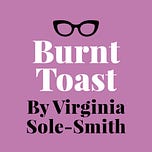




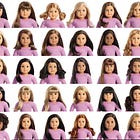
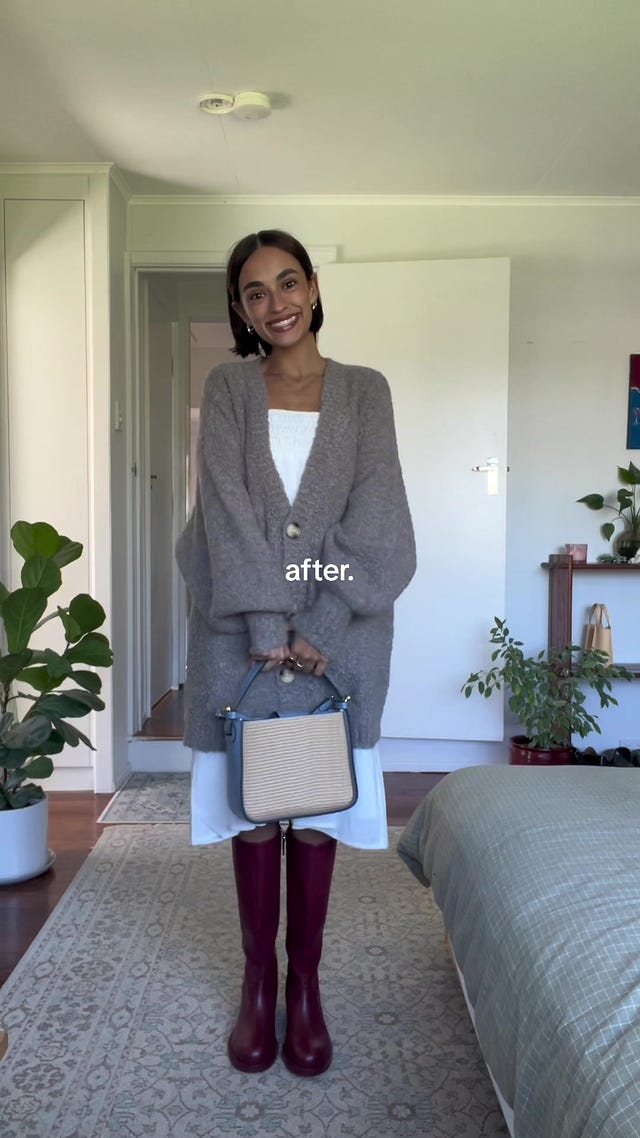

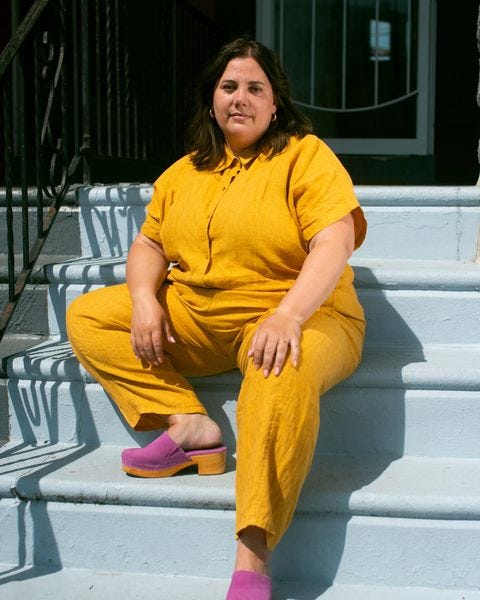
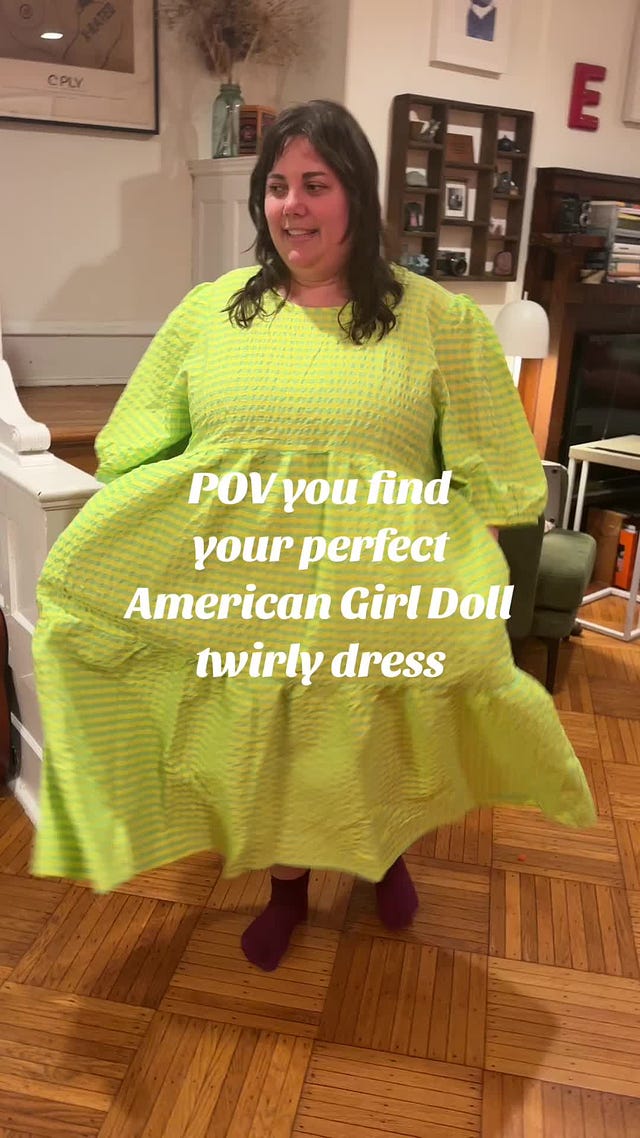

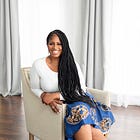

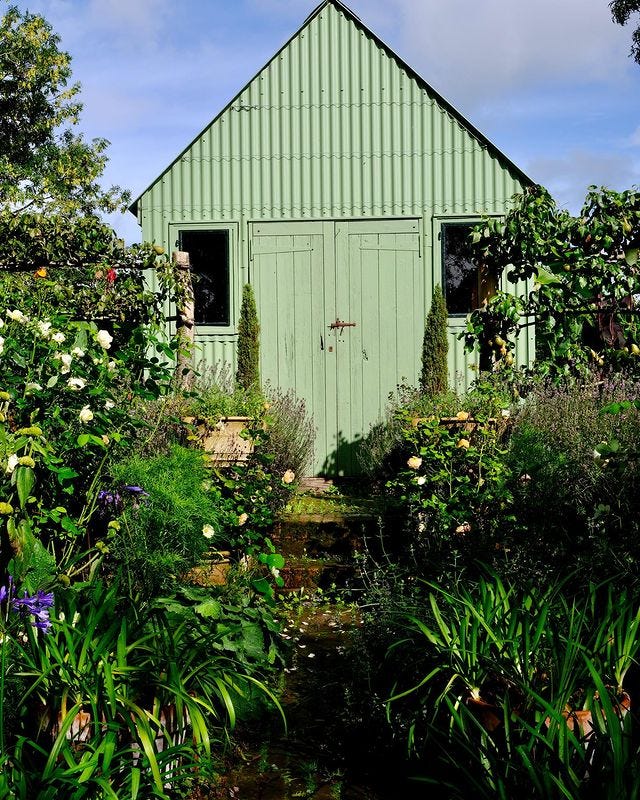


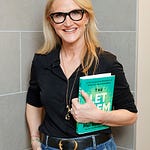
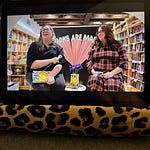

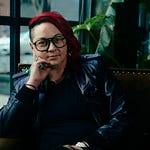




Share this post